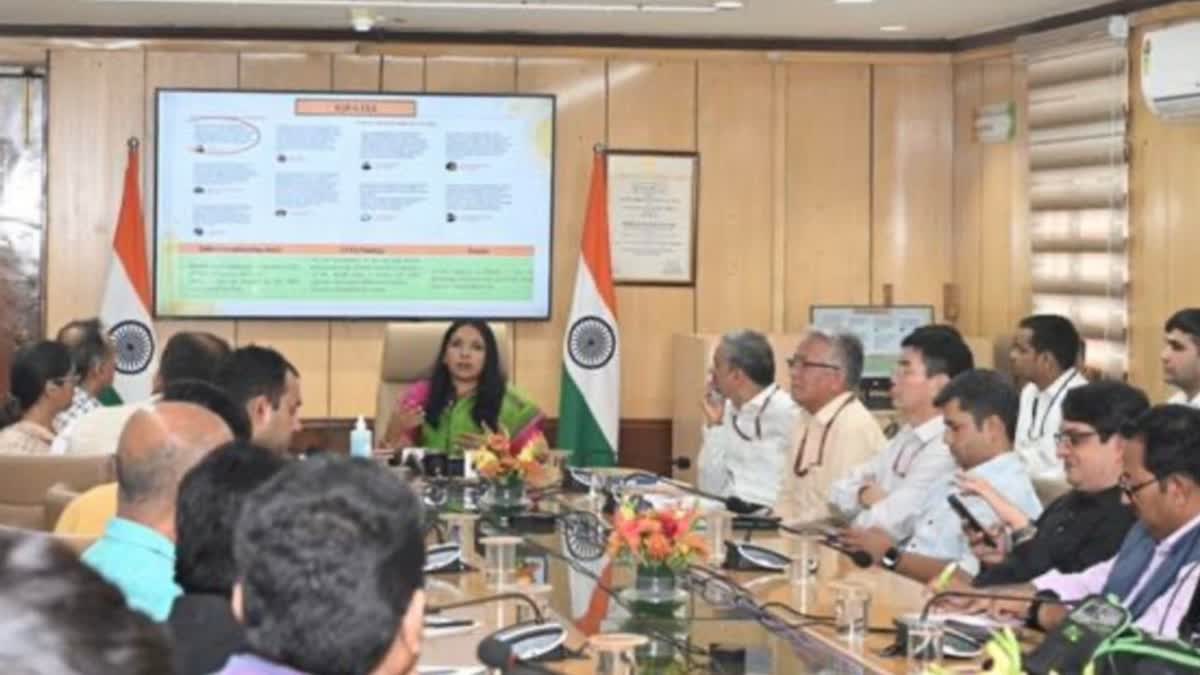New Delhi: In a major step to protect consumer rights and ensure transparency, the Central Consumer Protection Authority (CCPA) has introduced comprehensive guidelines aimed at combating misleading advertisements in the coaching sector. The “Guidelines for Prevention of Misleading Advertisement in Coaching Sector, 2024” focus on shielding students from deceptive marketing practices commonly employed by coaching centers.
Nidhi Khare, Chief Commissioner of the CCPA, announced the guidelines, which aim to ensure students and their families make well-informed choices about educational services.
New guidelines issued to coaching industry on advertisements. (ETV Bharat) As the coaching industry has grown, so has the issue of misleading claims. Gyanendra Tiwari, Professor at an IIT, discussed the importance of ethical practices in this sector with ETV Bharat, highlighting the issue of exaggerated success rates and fake endorsements by coaching centers. “The problem arises when coaching institutes start misrepresenting their faculty and results. Many times, they display photos of students who have not even attended their classes,” Tiwari noted. He emphasized that these tactics often mislead students and families into choosing institutes that may not deliver the promised results.
The CCPA’s guidelines come after consultations with various stakeholders, including the Ministry of Education, educational institutions, consumer organizations, and Edtech companies. In February 2024, a draft of these guidelines was shared for public comment, receiving feedback from 28 organizations, such as the India EdTech Consortium and the Consumer Education & Research Centre (CERC). The finalized guidelines address critical areas such as false success claims, endorser accountability, and contract transparency.
Key Definitions and Scope
The guidelines offer specific definitions to clarify the coverage and implications for the coaching industry:
• Coaching: Refers to academic guidance and instruction provided to students, excluding non-academic activities like sports and arts.
• Coaching Center: Defined as any facility serving more than fifty students.
• Endorser: Includes individuals promoting coaching centers, who must now verify claims to avoid endorsing false information.
These guidelines apply to all entities involved in coaching and extend accountability to endorsers and public figures promoting coaching centers. Endorsers are now required to verify any claims they endorse, such as success rates or guaranteed results. If they fail to do so, they can be held liable under the Consumer Protection Act, 2019.
Key Provisions in the Guidelines
1. Regulation of Advertisements: Coaching centers are prohibited from making false claims regarding courses, fees, faculty qualifications, success rates, job security, and admissions. Misleading advertisements related to exam results or guaranteed selections are also banned.
2. Truthful Representation: Coaching centers must provide accurate information about their infrastructure, faculty, and other resources to avoid deceiving potential students about the quality of their services.
3. Student Success Stories: Centers can no longer use a student’s name, photo, or testimonials in advertisements without written consent, which must be obtained after the student’s success. This measure helps reduce pressure on students to commit to promotional activities upfront.
4. Transparency and Disclosure: Coaching centers are required to clearly disclose the name, rank, and course details of students featured in ads, as well as whether these students paid for the course. Disclaimers must be prominently displayed, ensuring that key information is not hidden in fine print.
5. No False Urgency: Tactics that create a sense of urgency, such as limited seat claims, are prohibited to prevent pressuring students into quick decisions.
6. Partnership with the National Consumer Helpline: Coaching centers must collaborate with the National Consumer Helpline, allowing students to file complaints or concerns about misleading advertisements.
7. Fair Contracts: Contracts must be fair, and coaching centers are prohibited from requiring students to participate in promotional activities without post-selection consent. This prevents undue pressure on students from the outset.
8. Enforcement and Penalties: Any violation of these guidelines will be considered a contravention of the Consumer Protection Act, 2019. The CCPA has the authority to impose fines and take action against offenders.
Khare emphasized the CCPA’s commitment to working closely with stakeholders to ensure these guidelines are effectively enforced. The guidelines are designed to address unethical practices in the sector, which have impacted students’ trust and financial security.
CCPA’s Actions Against Misleading Advertisements
The CCPA has recently issued 45 notices to various coaching centers and imposed penalties totaling Rs 54.6 lakh on 18 coaching institutes found guilty of misleading advertisements. Additionally, the CCPA has directed these institutes to cease their deceptive marketing practices immediately.
The Department of Consumer Affairs has also been actively addressing student grievances. Through the National Consumer Helpline (NCH), students have increasingly turned to this platform for pre-litigation support. In 2024 alone, nearly 6,980 students have used the NCH to address issues with coaching centers, reflecting a growing trust in the system’s ability to provide justice.
NCH also initiated a focused drive to resolve refund-related complaints, helping students recover over Rs 1.15 crore from coaching centers between September 2023 and August 2024. These refunds were processed promptly, benefiting students from across the country who raised grievances about unfair practices.
The Guidelines for Prevention of Misleading Advertisement in Coaching Sector, 2024, in alignment with the Consumer Protection Act, 2019, mark a vital shift towards a more ethical and transparent coaching sector in India.
